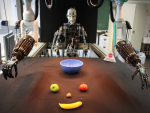 Unlike most existing approaches to the grasp selection task for anthropomorphic robot hands, this vision-based project aims for a solution, which does not depend on an a-priori known 3D shape of the object. Instead it uses a decomposition of the object view (obtained from mono or stereo cameras) into local, grasping-relevant shape primitives, whose optimal grasp type and approach direction are known or learned beforehand. Based on this decomposition a list of possible grasps can be generated and ordered according to the anticipated overall grasp quality.
Unlike most existing approaches to the grasp selection task for anthropomorphic robot hands, this vision-based project aims for a solution, which does not depend on an a-priori known 3D shape of the object. Instead it uses a decomposition of the object view (obtained from mono or stereo cameras) into local, grasping-relevant shape primitives, whose optimal grasp type and approach direction are known or learned beforehand. Based on this decomposition a list of possible grasps can be generated and ordered according to the anticipated overall grasp quality.
read more »











































